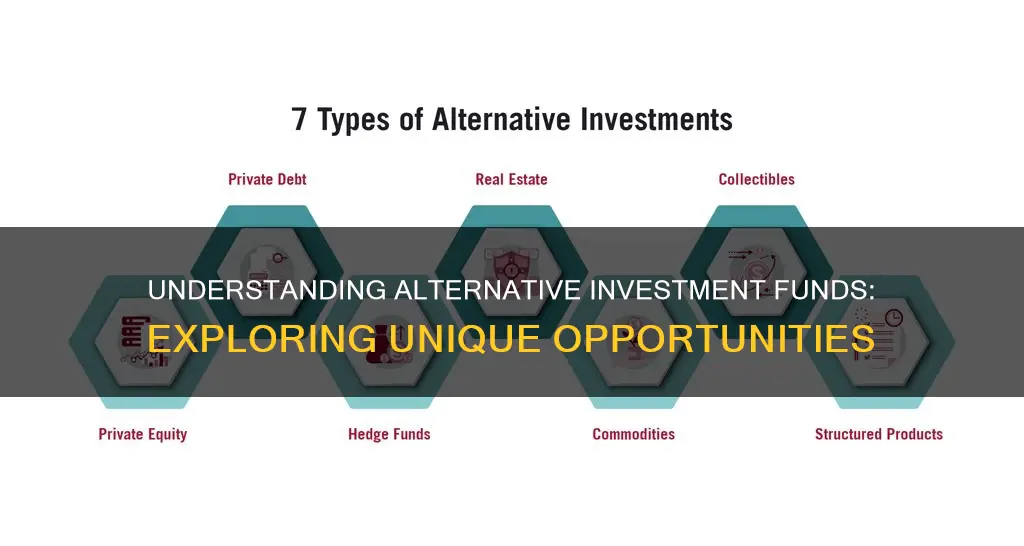
Alternative Investment Funds (AIFs) are a special category of investment that differs from conventional instruments like stocks, bonds, and cash. AIFs are privately pooled funds that collect money from sophisticated investors and institutions, investing in non-traditional asset classes such as private equity, venture capital, hedge funds, real estate, commodities, and derivatives. AIFs are generally considered to be high-risk, high-return investments and are therefore popular among mature investors with a substantial amount of capital. These funds are regulated by the Securities and Exchange Board of India (SEBI) and offer investors access to alternative asset classes and investment strategies.
What You'll Learn

Alternative Investment Funds (AIFs)
AIFs can include a wide range of investment strategies and structures, such as hedge funds, private equity funds, and real estate investment trusts (REITs). These funds may invest in various asset classes, including private equity, private debt, real estate, commodities, and venture capital.
One of the key characteristics of AIFs is their focus on non-traditional investments. These investments are often less liquid and more complex than traditional investments. For example, private equity involves investing in privately held companies, which are not publicly traded on stock exchanges. This lack of public trading makes it more difficult to sell or convert these investments into cash quickly, and they are considered illiquid. Additionally, alternative investments are often unregulated or less heavily regulated by regulatory bodies such as the U.S. Securities and Exchange Commission (SEC). This lack of regulation can result in less transparency and higher risks for investors.
Another important feature of AIFs is their potential for higher returns. Due to the complex nature and illiquidity of alternative investments, they are considered riskier than traditional investments. However, this also provides the opportunity for higher rewards. Alternative investments can generate significantly higher returns than traditional investments, sometimes ranging from 50 to 100 percent. As a result, AIFs typically have longer investment timelines to account for the potential for higher returns over the long term.
Furthermore, AIFs offer investors the benefit of diversification. By investing in a range of non-traditional assets, AIFs can help investors reduce the risk of their portfolios. Alternative investments often have a low correlation with traditional investments, meaning they do not move in the same direction as stocks or bonds during economic downturns or upswings. This diversification can be particularly valuable for investors looking to protect their portfolios during market downturns, as alternative investments tend to perform better during these periods.
In conclusion, Alternative Investment Funds (AIFs) provide investors with access to a diverse range of non-traditional investments. By investing in alternative assets such as private equity, real estate, and commodities, AIFs offer the potential for higher returns and portfolio diversification. However, it is important for investors to carefully consider the unique characteristics and risks associated with AIFs, including illiquidity, complex structures, and limited regulation.
Investing After an Emergency: Where to Begin and How
You may want to see also

High-net-worth individuals
AIFs are particularly attractive to HNIs because they offer the potential for higher returns than traditional investments. For example, in 2022, high-net-worth investors allocated 28% of their assets to alternative investments, compared to only 5% for the average investor. This percentage is expected to grow to 30% by 2029.
However, it is important to note that AIFs also come with higher risks and often have a complex structure. They are typically only available to accredited investors, who have a net worth exceeding $1 million or an annual income of at least $200,000.
There are three main categories of AIFs:
- Category I: These funds invest in start-ups, early-stage ventures, social ventures, SMEs, or infrastructure projects. They include venture capital funds, SME funds, social venture funds, and infrastructure funds.
- Category II: These funds do not fall under Categories I or III. They do not use leverage or debt beyond what is needed for day-to-day operations. Examples include private equity funds, debt funds, and funds of funds.
- Category III: These funds use complex trading strategies and may employ leverage or debt for investing in listed or unlisted derivatives. Examples include private investment in public equity funds (PIPE) and hedge funds.
AIFs are regulated differently from traditional investments. In the United States, they are subject to the Dodd-Frank Wall Street Reform and Consumer Protection Act and examined by the Securities and Exchange Commission (SEC). However, they are not required to register with the SEC and are therefore not directly overseen or regulated by them.
When considering AIFs, investors must carefully weigh the risks and conduct extensive research. These investments are generally only suitable for mature investors with a high-risk tolerance and a substantial amount of capital to invest.
A Guide to Mutual Fund Investment in Nigeria
You may want to see also

Types of AIFs
The Securities and Exchange Board of India (SEBI) categorises Alternative Investment Funds (AIFs) into three broad types: Category I, Category II and Category III.
Category I AIFs
Category I AIFs invest in startups, early-stage ventures, SMEs, social ventures, infrastructure or other sectors that are considered economically and socially desirable. These funds are incentivised and promoted by the government as they have a positive multiplier effect on the economy in terms of growth and job creation. Category I includes:
- Venture Capital Funds (VCFs)
- Infrastructure Funds (IFs)
- Angel Funds
- Social Venture Capital Funds (SVCFs)
Category II AIFs
Category II AIFs are funds that do not fall under Category I and III and do not undertake leverage or borrowing other than to meet day-to-day operational requirements. The government does not offer any incentives or concessions for investment in these funds. Category II includes:
- Private Equity (PE) Funds
- Debt Funds
- Funds of Funds
Category III AIFs
Category III AIFs aim for short-term returns and employ diverse and complex trading strategies to achieve their goals. The government does not offer any incentives or concessions for investment in these funds. Category III includes:
- Hedge Funds
- Private Investment in Public Equity (PIPE)
Rockbridge Fund: A Guide to Investing Wisely
You may want to see also

Benefits of AIFs
Alternative Investment Funds (AIFs) offer a range of benefits to investors, particularly those looking for alternatives to traditional investment options. Here are some key advantages of AIFs:
High Return Potential:
AIFs offer the potential for higher returns compared to traditional investments due to their focus on non-traditional asset classes and broader investment strategies. The large pooled funds give managers flexibility in implementing strategies aimed at maximising returns.
Diversification:
AIFs provide investors with access to a diverse range of assets and strategies, including real estate, private equity, commodities, hedge funds, and more. This diversification helps reduce exposure to market volatility and can act as a buffer during financial crises.
Low Correlation to Stock Markets:
AIFs are not directly linked to the performance of the stock market, which means they offer lower volatility compared to traditional equity investments. This feature makes them attractive to risk-averse investors seeking more stable options.
Access to Specialised Opportunities:
AIFs provide investors with access to specialised investment opportunities that are typically unavailable to retail investors. For example, AIFs may invest in startups, early-stage companies, or innovative sectors, offering exposure to cutting-edge ideas and technologies.
Hedge Against Inflation:
Some AIFs invest in assets such as commodities and real estate, which have historically performed well during inflationary periods. As a result, investing in AIFs can help preserve the value of an investor's portfolio during times of high inflation.
While AIFs offer these advantages, it is important to remember that they also carry higher risks, costs, and liquidity constraints. Investors should carefully evaluate their own risk tolerance, conduct thorough research, and seek professional advice before investing in AIFs.
Index Funds: Investing via ICICI Direct
You may want to see also

Who can invest in an AIF?
Alternative Investment Funds (AIFs) are a special category of investment that differs from conventional investment instruments. They are privately pooled funds that are generally used by institutions and high net worth individuals (HNIs) as they require substantial investments.
Resident Indians, NRIs (Non-Resident Indians), and foreign nationals are eligible to invest in AIFs. Joint investors, such as spouses, parents, or children of investors, can also invest. The minimum investment amount for investors is Rs1 crore, whereas for directors, employees, and fund managers, the minimum limit is Rs 25 lakh.
AIFs typically have a minimum lock-in period of three years and the maximum number of investors in every scheme is restricted to 1,000, except for angel funds, where the number of investors can go up to 49.
AIFs are an attractive option for investors seeking diversification and higher returns outside traditional asset classes like stocks and bonds. They offer the potential for higher returns, portfolio diversification, and lower volatility compared to traditional investments. However, it is important to note that AIFs are complex products and may not be suitable for small investors or those who are risk-averse.
Real Estate Mutual Funds: Diversify Your Investment Portfolio
You may want to see also
Frequently asked questions
Alternative Investment Funds (AIFs) are a special category of investment that differs from conventional instruments like stocks, bonds, and cash. AIFs are privately pooled funds that collect money from investors to invest in non-traditional asset classes, such as real estate, commodities, private equity, and hedge funds.
AIFs typically attract high-net-worth individuals (HNIs), institutions, and family offices. The minimum investment amount is higher than traditional investments, making them less accessible to the general public or retail investors.
AIFs offer the potential for higher returns and low volatility due to their focus on non-traditional assets and strategies. They provide diversification benefits, allowing investors to access a wide range of assets and strategies beyond the stock market. AIFs can also provide access to niche markets and sectors that may be difficult to invest in through conventional means.







